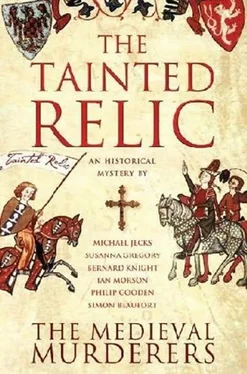‘With whom was he arguing?’ demanded Michael, peeved that the information had not been shared with him. He was Senior Proctor, and should have been the first to know about eminent academics arriving in his town.
‘With Big Thomas, although it is an unlikely pairing-an eminent theologian and a one-time thatcher. Thomas and Witney were bawling at each other like fishmongers, and Witney’s companion was powerless to stop them. Thomas seems to like screaming at people: he just hollered at Morden in much the same way.’
‘Fighting in public places is against university rules,’ said Michael angrily. ‘You should have mentioned this sooner.’
‘They were quarrelling, not fighting-about thatching, would you believe? But then Little Tomas arrived, and he succeeded in quietening them. The incident ended peacefully enough.’
They arrived at St Bernard’s, which stood opposite the recently founded Bene’t College on the High Street. It comprised three houses that had been knocked into one, providing a hall with two teaching chambers on the ground floor, and several smaller rooms above in which visiting scholars were accommodated.
A servant answered the door, and ushered Michael and Bartholomew into the smaller of the two lower-floor rooms. It smelled of wood smoke and the oil that had been used to make benches and tables shine. At the far end, by the hearth, stood three men. As Bartholomew approached, he was immediately aware of a tension between them. One stood apart from the others. He was tall, his grey hair was neatly trimmed, and he wore the habit of a Franciscan. He held himself stiffly, clearly furious. He was Witney’s companion, the man who had been unable to calm his colleague during the spat with the loud-mouthed thatcher.
The other two were a Carmelite and his apprentice. The White Friar was elderly and frail, and Bartholomew did not think he had ever seen more haunted eyes. His novice was burly and young, with thick yellow hair and the kind of face that did not seem made for priestly solemnity.
There was a fourth man in the room, too, whom Bartholomew had not immediately noticed, and who looked as though he was about to climb up inside the chimney. His head and shoulders were out of sight, while his body and legs, clad in the robes of a Franciscan, were stretched across the floor. It was Witney. As the physician drew closer, he saw soot had cascaded downward, leaving a dirty black residue over the fine wooden floor. Horrified, he hurried forward and grabbed the prone legs, hauling the body out of the fireplace. Dust billowed in all directions, causing the three onlookers and Michael to jump back, in order to avoid being coated in filth. The Oxford scholar became angrier still.
‘Have a care!’ he shouted, brushing himself down. ‘You should have removed him gently, so you did not scatter grime over the rest of us.’
‘He might have been alive,’ objected Bartholomew, although he could see that Witney’s rescue from the choking embrace of the hearth had come far too late. The open eyes were clotted with powder, which also clogged his nose and mouth. Blackened though the face was, Bartholomew could still make out an unnatural blueness there. He also noticed blood at the back of the skull, where something heavier than soot had landed on it.
‘He would not have been alive,’ said the novice. ‘Not after what he did.’
‘What do you mean?’ asked Michael. ‘And who are you, anyway?’
‘Urban,’ replied the youngster. He gestured to his elderly companion. ‘And this is Father Andrew, my teacher. We travelled here from Devonshire.’
‘Speak when you are asked,’ said Andrew sharply. The novice’s pained grimace indicated he was used to such admonitions but that he had not yet learned to bear them with grace. ‘It is not for you to make introductions.’
‘ My name is John Seton and I am Master of Grey Hall in Oxford,’ said the Franciscan, in the kind of voice that indicated he considered himself superior to mere Carmelites. He gestured to the body. ‘And this is my colleague, Peter of Witney. He has been murdered.’ His cool glance in Andrew’s direction made it clear whom he considered his prime suspect.
‘And I am the university’s Senior Proctor,’ said Michael coolly. ‘It is for me and Dr Bartholomew to determine your colleague’s cause of death.’ He turned to Bartholomew. ‘Has he been murdered? I see a cut on his head.’
‘That was caused when this stone struck his skull,’ replied Bartholomew, holding up the offending piece of masonry for the monk to see. He demonstrated how its square edge fitted perfectly into the jagged gash on the dead man’s head, although neither Michael nor the other three paid close attention to the grisly illustration.
Seton pointed an accusing finger at Andrew. ‘That stone was wielded by him . He has been hostile towards poor Witney ever since we arrived. It is clear what happened here, Brother. Arrest the Carmelite and let us make an end of this unhappy business.’
‘There are questions I want answered first,’ replied Michael, raising one hand to stall the litany of objections that started to burst from Urban. Andrew made no attempt to deny the accusations, and merely stood regarding the dead man dispassionately. ‘This is Cambridge, not Oxford. We are rather more civilized here, and do not go around arresting men before we have properly examined the evidence. Matt: what can you tell me?’
‘The stone probably dropped down the chimney,’ replied Bartholomew, peering up the dark funnel and noting that it was not in good repair. ‘But the injury is not serious enough to have killed him outright. I imagine he breathed his last inhaling the soot that came with it. In other words, he was stunned by the blow, and was insensible to the fact that the soot was choking him.’
‘Someone did not hit him, then shove him and the stone up the chimney to make it look as though the death was an accident?’ asked Michael.
Bartholomew shook his head. ‘From the juxtaposition of stone, soot and body, there are only two possibilities: either Witney was looking up the chimney when it collapsed, or someone climbed on the roof and dropped the stone when he happened to be underneath. You will agree that it would have to be a very patient killer for the latter to be true.’
‘Witney was not in the habit of peering up chimneys,’ said Seton angrily. ‘He was a scholar, like me. He was here to study, not to prod about inside hearths.’
‘He was not always devoted to his studies,’ said Andrew softly. ‘He spent a lot of time walking around churches, looking at relics.’
‘So?’ demanded Seton, outraged by what sounded like an accusation. ‘He was interested in them. It is not a crime.’
‘Perhaps,’ replied Andrew non-committally. ‘But perhaps not.’
‘Now you listen to me,’ began Seton hotly. ‘You cannot-’
‘Wait for me in your chamber, Master Seton,’ interrupted Michael. ‘I will see your colleague is removed to St Botolph’s Church and decently laid out. Then I will hear your complaints.’
Seton scowled at the Carmelites before snatching up his hat and stalking away.
Father Andrew smiled wanly after Seton had gone. ‘Divide and conquer: that is one of the first lessons I learned when dealing with unruly lads-I once held a post similar to yours, Brother. Separate the factions and speak to them apart. Of course, sometimes it is wiser to let them argue, so that one may make a fatal slip and reveal himself a villain.’
‘Is there a villain here?’ asked Michael, raising his eyebrows. ‘Or just a case of a man being in the wrong place at the wrong time?’
‘There is a villain,’ replied Andrew with considerable conviction. ‘But it is not a man.’ He fumbled with something tied around his neck with a leather thong. It was a pouch made of ancient purple cloth, and looked like the kind of amulet carried by peasants too superstitious to place their faith entirely in the Church. Thinking it was being proffered to him, Michael reached out to take it, but the friar drew back sharply.
Читать дальше












